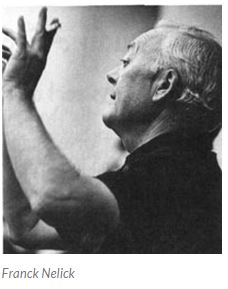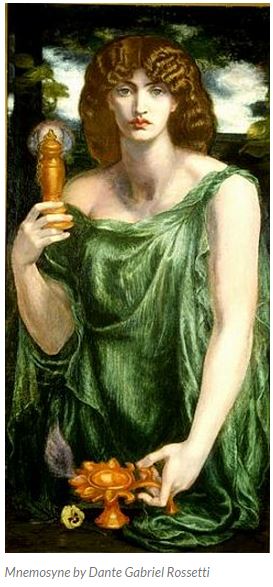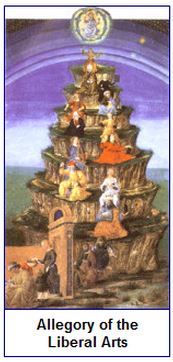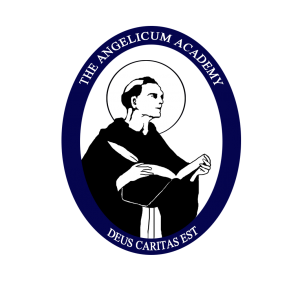 THE DARKLING PLAIN OF POETRY by Frank C. Nelick
THE DARKLING PLAIN OF POETRY by Frank C. Nelick
Not long ago, I discussed a story by Ambrose Bierce with a group of freshmen. Marred by the author’s bitter condescension and some rather obvious contrivance, the “Boarded Window” has little to recommend it; but it often raises some questions in the minds of students. Encouraged by their interest, I suppose, I found myself describing the story as an example of an American transmutation of the Gothic romance complete with castle and dark villain. In the midst of a sentence filled with authority, I realized that I was guilty of the cardinal error of bad teaching: I was giving literary answers to human questions which my students had not as yet even formulated. Moreover, I had, at least in this instance, made impossible for them any understanding of literature as an art by disregarding its meaning and substituting a quasi-historical analysis of its antecedents.
The students, indeed, were happy; all students are when they are being given the facts, any facts, which they may later recite singly or in combinations on examinations. Unfortunately, it is often that class which concentrates on data, regardless of how extensive it may be, which the student feels “he got most out of.” Bright students are keenly aware that when a professor opens a lecture with a statement like, “Lear has often been accounted Shakespeare’s greatest tragedy, but without some knowledge of the Elizabethan Playhouse its triumph remains obscure,” they are being told the answer to an examination question which reads: “How is some knowledge of the Elizabethan Playhouse necessary to an understanding of Shakespeare’s Lear?” Intelligent students suffer from this abuse more than others because they are not only responsive but singularly adept at memory games. They are, however, capable of a much more demanding and exciting kind of education.
Although it is true that Bierce’s “Boarded Window” is a Gothic tale and is probably carefully documented somewhere as such, and some knowledge of the Elizabethan Playhouse is necessary to understanding parts of Shakespeare, all discussions of literature of merit must sooner or later leave merely technical concerns and turn to the human. For poetry the comprehensive term is an art and, as such, has an end proper to it.
In evading my proper responsibility I was both in the best of modern company and impeccably legitimate historical descent. Answering human questions or perhaps more precisely, disregarding them in literary terms is the vogue of modern criticism and a heritage of the most audacious innovation of the Renaissance. It is an error to think of the humanists as only re-discoverers. Their major discovery, or perhaps invention, was the fulfillment of a medieval scribe’s dream, made easy by moveable type: knowledge could be reduced to words and put in print.
 The older notion of knowledge existing in the great dialogue of minds in articulation was greatly lost in their restless and acquisitive enthusiasm; “teaching” was replaced by “scholarship”; and libraries first came to be regarded, as they are now, the repositories of wisdom. In all ways, this discovery encouraged concentration on relationships between words rather than between things, and from the Renaissance until the present time most literary study has been more concerned with the properties of style and the nice handling of narrative than with an identification of the realities which great poetry exposes. Traditional reverence for the text as a vehicle of truth has been in the main replaced by idolatrous worship of complex structural cohesion. One can seldom ask, except in the security of his family or friends, who also “think like that” the simple question of a poem. “What does it mean?” In fact, one eminent American poet has gone so far as to say that a poem should be palpable and mute, something, he imagines, like a globed fruit. A poem should not mean, he claims, but be. This is a most peculiar thing for a poet to say for he should know better than others that poetry, like all art, is the imitation of a process, and that in stasis there is no significant syntax and only one inflected form.
The older notion of knowledge existing in the great dialogue of minds in articulation was greatly lost in their restless and acquisitive enthusiasm; “teaching” was replaced by “scholarship”; and libraries first came to be regarded, as they are now, the repositories of wisdom. In all ways, this discovery encouraged concentration on relationships between words rather than between things, and from the Renaissance until the present time most literary study has been more concerned with the properties of style and the nice handling of narrative than with an identification of the realities which great poetry exposes. Traditional reverence for the text as a vehicle of truth has been in the main replaced by idolatrous worship of complex structural cohesion. One can seldom ask, except in the security of his family or friends, who also “think like that” the simple question of a poem. “What does it mean?” In fact, one eminent American poet has gone so far as to say that a poem should be palpable and mute, something, he imagines, like a globed fruit. A poem should not mean, he claims, but be. This is a most peculiar thing for a poet to say for he should know better than others that poetry, like all art, is the imitation of a process, and that in stasis there is no significant syntax and only one inflected form.
In many quarters there seems to be a rather total confusion of means and ends; or, if Macleish were to have his way, a rejection of ends. This is probably because it is so easy to acquire a gratifying and impressive knowledge of means, but comprehension of ends is so difficult to come by. Sometimes the confusion is hilarious. In one commonly used and very highly respected introductory textbook by the author-editor implies that an innocuous little poem by Tennyson entitled “The Eagle” is the veritable eagle itself. I can never read the comment without remembering my grandfather, who was, one might say, deeply uneducated. But he never would have made the scholar’s error, for as a boy he had trapped eagles, and knew, I am sure, the differences between a poem and a bird.
The results of the confusion are less frequently humorous, however, than they are seriously damaging both to the intention of the text itself and to the intellect that studies it. One influential scholar claims that “it is literature as an order of words which forms the primary context of any given work of literary art.” Going even further, he offers the opinion that “scholarship”, or the knowledge of literature has both priority to value-judgements and the power of veto over them.” Here one may recognize the full implications of the confusion between words, or the tools of literature, and the thing which is represented by those tools. First of all, the notions which this critic expresses are conducive to a bourgeois intellectualism, unfortunately much prized in an enlarging segment of the academic circle which values achievement in dialectical or rhetorical skill on any subject. Such habits lead only to timid and endless talkative comparison of opinions in which every point of view is regarded as being equally important, or the same thing equally trivial.
This dominance by specialty and method, or “scholarship” as it is called, rakes away from poetry all recognition of its purpose or direction as an art. No one could ever answer the question “What is poetry good for?” in terms of the linguistic context, and far from being a foolish question, it is one that should always be answered. Traditionally, the final cause of literature has been considered to be instruction of the person by delight. Poetry aims to delight by the recognition on the part of the reader or auditor of similarities between things which the poet has seen in the first place and “put” in his poem; virtually every critic who has concerned himself with the purpose of poetry has concluded that the sense “delights in things duly proportioned, as in things similar to itself.” And to the extent that poetry represents, or pictures, or imitates nature, it deals with reality and in so doing instructs. For these reasons one can learn from reading MacBeth something of what is horrifying and corrosive about ambition, or, from the recognition of Desdemona, a sharpened understanding of the girl-next-door.
Finally, concentration upon the means or tools or instruments of poetry rather than upon the virtue or truth toward which it strives as an art renders education as distinct from training impossible. Education means to fulfill, to complete, to draw out, not to fill up; and it addresses itself to an assent to truth by the total intellectual, physical, moral, spiritual being, not to mere memory or the acquisition and mastery of techniques. This understanding is especially important in undergraduate education, for no university is ever great except by virtue of the education it offers its undergraduates but, of necessity it received less emphasis in study for higher degrees. These primarily certify, on the basis of university reputation, the technical preparation and training of the graduate. But even in advanced education to give primary importance to training in forms and words and literary constructions rather than to the delightful instruction of poetry is to reverse the natural bent of the mind. We often forget, because, as Frost remarked, the woods are indeed distracting, lovely, dark and deep, that there are miles to go before we sleep; and even so austere a man as John Milton tolerated the possibility of sporting with Amaryllis in the shade.
 On all sides there are indications that the decay of the discipline worsens. Deans, chairmen, federal bureaucrats and the lesser lights of eager committees fear, after “agonizing scrutiny”, that the Humanities are in for hard times in the years ahead. Humane studies are indeed in total disarray; in the past twenty years or so, the faithful shepherds have become naughty Boy Blues who, either on the intellectual or chemical nod, not only failed to guard their heritage but even aided in its abandonment. For a number of reasons baby booms, Sputniks and the space race, college as an evasion of Viet Nam faculties have become gaggles of chic and feckless trendy liberals who have not only landed in their little magazines but have established a very firm beachhead; there are no pockets of resistance perceptible. The integrity of the profession is lost, for the very notion of integration as a force which lies outside the profession has evanesced in one or another of the modern disjunctions of the good and the beautiful, the body and the soul, the means and the end. There is nothing new in the malady: Linnaeus gave evidence of the disease when he claimed that when names were lost the things themselves were lost. Our schoolboy assumptions that the poem is a linguistic cosmos is pallid and flabby by comparison with the Enlightenment passion for classification. In our times, words like University, Doctor, Philosophy and Professor are virtually meaningless, describing what once-upon-a-time must have been but are now lost in the vagaries of hellish mindless winds of change. It alone seems to have value, and expertise and scholarship are appropriate to the novelties that succeed themselves endlessly. Things that are self-evident, simple, plain, received, orthodox, and ordinary have no place in studies. All students are advanced and all faculties are distinguished.
On all sides there are indications that the decay of the discipline worsens. Deans, chairmen, federal bureaucrats and the lesser lights of eager committees fear, after “agonizing scrutiny”, that the Humanities are in for hard times in the years ahead. Humane studies are indeed in total disarray; in the past twenty years or so, the faithful shepherds have become naughty Boy Blues who, either on the intellectual or chemical nod, not only failed to guard their heritage but even aided in its abandonment. For a number of reasons baby booms, Sputniks and the space race, college as an evasion of Viet Nam faculties have become gaggles of chic and feckless trendy liberals who have not only landed in their little magazines but have established a very firm beachhead; there are no pockets of resistance perceptible. The integrity of the profession is lost, for the very notion of integration as a force which lies outside the profession has evanesced in one or another of the modern disjunctions of the good and the beautiful, the body and the soul, the means and the end. There is nothing new in the malady: Linnaeus gave evidence of the disease when he claimed that when names were lost the things themselves were lost. Our schoolboy assumptions that the poem is a linguistic cosmos is pallid and flabby by comparison with the Enlightenment passion for classification. In our times, words like University, Doctor, Philosophy and Professor are virtually meaningless, describing what once-upon-a-time must have been but are now lost in the vagaries of hellish mindless winds of change. It alone seems to have value, and expertise and scholarship are appropriate to the novelties that succeed themselves endlessly. Things that are self-evident, simple, plain, received, orthodox, and ordinary have no place in studies. All students are advanced and all faculties are distinguished.
The “Humanities” were once the staples of education. They dealt with the received body of recognized excellence about which there was an orthodoxy of opinion. In English literature the higher examinations were over “1066 and all that” from Beowulf to Virginia Woolf. There was, quite simply, a body of literature which everyone was expected to be familiar with in great detail. The other things, the arcane, the exotic and the peculiar were for private taste. The product was a person who above all loved literature and who had submitted himself to the leisurely constraint of a history which was sequential but not progressive in implication. The study had a center; there was a very firm assumption of what every young Ph.D. should know and transmit in his teaching. Faculties were formed and renewed on the basis of these assumptions. But the center did not hold; it is all in pieces, all coherence gone.
Perhaps what started it all and has caused it to accelerate in recent times is a loss of priorities, a failure to deal with first things first. Taking as a model the spectacular success in discovery of the hard sciences, we were avid to do “advanced” study considering it somehow to be better than preserving the best. Certainly had we known our Aristotle better we would have remembered why he labeled some things the Physics and others the Metaphysics. Poetry is not an advanced thing; it is, exactly as Latin is, a first thing. It is a child’s thing; perhaps universities can offer it only as an expert discipline assuming that students came first to love it somewhere in an unusual childhood. There is, however, a season to all things, and probably twenty is too late to memorize and there is nothing to remember poetry or even to master a declension. If this be doomsaying, it is shared by the most brilliant intellects I have known. The credentials of those who think this way are impeccable; they are without exception the most successful of teachers, and deeply serious men who despite random and capricious opinion.
What is to be done? Mortimer Adler considers the situation to be in fact hopeless; I agree. What is the plight of one who genuinely attempts to teach poetry? He serves neither students nor himself; neither chairmen or deans; neither chancellors nor boards of regents; and certainly he does not serve poetry itself, for poetry itself is about that thing other than itself which it serves. Poetry is a coming into being of recognition, a process of seeing for the first time. Miss Millay would have it that “Euclid alone has looked on beauty bare.” Most of us are either incapable or unprepared for the Euclidian shock, but we rejoice with Frost that we have at least for once seen something other than our own godlike image in the mirror of the real. Often it deals with a glimpse of something so remote or vaguely possible as Faith or Hope or Love. And one is helpless when confronted with this hint of the thing itself; as Merlin once advised Arthur, and the etymology may be too candid for all but the hardiest, only “admire.” The mood is imperative for teacher, student and culture alike.
The scope of poetry is as broad as the comprehension of humanity which one sees, for example, in Chaucer’s pilgrims: saints and sinners, foolish and wise, destroyers and preservers, knights and knaves, queens and quenes, however apparently disparate, bound together in adventure toward a common destiny. Poetry is a lovely and exciting invitation and it cannot be treated otherwise. Cummings called it a promise of miracles, tints everywhere childrening, beautiful answers which ask the more beautiful question. We are asked to come hither, perhaps to go along with Frost down to clean the pasture spring; we shan’t be gone long and we really cannot refuse for perhaps we shall hear his long scythe whispering to the ground or the Highland lass singing. We are asked to be docile and ready to recognize Hopkins’ chevalier and Chaucer’s Knight, to progress with burdened Aeneas or Bunyan’s sad pilgrim, to hear courageous Shelley’s blithe spirit or contumacious Hardy’s sentient thrush; we are commanded to be compassionate and rejoice for Lycidas and Adonais for they are not dead. Poetry is that way of becoming aware by apprehension at least of what Tennyson’s Ulysses sought beyond the limits of human thought, or what Keats found through the magic casements opening wide, what poor senile Lear saw in the naked beggar, or even what Swift recognized in a woman flayed alive.
It is as possible for poetry and the poetic order of knowledge to be lost as, say, culture or religion; it is certainly, by all accounts, later than we think. To paraphrase Nietzsche: Poetry is dead and the uneducated specialists have killed it by making it extraordinary, uncommon and, in their own image, eccentric.
v

